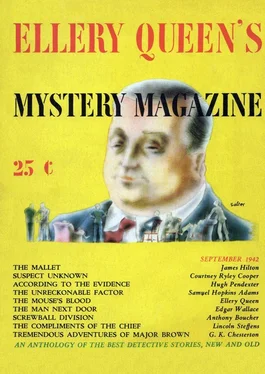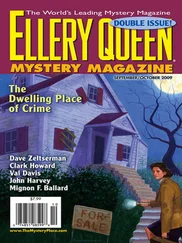Энтони Бучер - Ellery Queen’s Mystery Magazine. Vol. 3, No. 4, September 1942
Здесь есть возможность читать онлайн «Энтони Бучер - Ellery Queen’s Mystery Magazine. Vol. 3, No. 4, September 1942» весь текст электронной книги совершенно бесплатно (целиком полную версию без сокращений). В некоторых случаях можно слушать аудио, скачать через торрент в формате fb2 и присутствует краткое содержание. Город: New York, Год выпуска: 1942, Издательство: The American Mercury, Жанр: Детектив, на английском языке. Описание произведения, (предисловие) а так же отзывы посетителей доступны на портале библиотеки ЛибКат.
- Название:Ellery Queen’s Mystery Magazine. Vol. 3, No. 4, September 1942
- Автор:
- Издательство:The American Mercury
- Жанр:
- Год:1942
- Город:New York
- ISBN:нет данных
- Рейтинг книги:4 / 5. Голосов: 1
-
Избранное:Добавить в избранное
- Отзывы:
-
Ваша оценка:
- 80
- 1
- 2
- 3
- 4
- 5
Ellery Queen’s Mystery Magazine. Vol. 3, No. 4, September 1942: краткое содержание, описание и аннотация
Предлагаем к чтению аннотацию, описание, краткое содержание или предисловие (зависит от того, что написал сам автор книги «Ellery Queen’s Mystery Magazine. Vol. 3, No. 4, September 1942»). Если вы не нашли необходимую информацию о книге — напишите в комментариях, мы постараемся отыскать её.
Ellery Queen’s Mystery Magazine. Vol. 3, No. 4, September 1942 — читать онлайн бесплатно полную книгу (весь текст) целиком
Ниже представлен текст книги, разбитый по страницам. Система сохранения места последней прочитанной страницы, позволяет с удобством читать онлайн бесплатно книгу «Ellery Queen’s Mystery Magazine. Vol. 3, No. 4, September 1942», без необходимости каждый раз заново искать на чём Вы остановились. Поставьте закладку, и сможете в любой момент перейти на страницу, на которой закончили чтение.
Интервал:
Закладка:
Professor Roscoe Quell, a nephew and the contestant in the case, had won enviable recognition both at home and abroad by his scientific researches, and was the author of more than one authoritative text-book. He was a man in the prime of life and already had reaped substantial rewards from his scholarly endeavors.
But perhaps the most interesting character in the little drama was the proponent, Miss Alice Asher, a niece of the testator, who received the million-dollar estate under the terms of the will, the nephew being cut off for the reason that he possessed an ample fortune while his cousin was penniless. But if the niece was bankrupt in pocket unless she profited by the provisions of the will, she was most generously endowed with beauty and, so far as her personality during the contest could be gauged, with an extremely attractive and womanly nature. Up to the time of the testator’s death the relations between uncle and nephew had been most friendly, the latter often being a visitor at the Asher mansion.
Last, but possibly not least, in focusing the attention of the press was the fact that Walter Riggsley, celebrated in surrogate’s practice for successful assaults on wills where large estates were involved, appeared for Professor Quell, while the fair proponent was represented by that veteran of eccentric practice, Ezra Stackpole Butterworth, founder of the Bureau of Abnormal Litigation, whose advent in a case licensed the expectation that the ordinary routine of the law would be ignored. The appearance of Mr. Butterworth in any suit was sufficient to set the press-table to buzzing.
At the opening of the contest the Surrogate experienced a sensation of uneasiness, for he had been annoyed several times by the old lawyer, whose unexpected methods and shrewdness had more than once resulted in a reversal of the court’s ruling by a higher tribunal. But as the hearing progressed and Mr. Butterworth, now the champion of normality, was compelled to confine his efforts to normal lines of proof, the court relaxed in his forebodings and at the end of the second week was wearing his official black robe with complacency.
Immediately after the formal proof of the will was offered, Mr. Riggsley began his battering attacks upon the competency of the testator, calling witness after witness to testify to the decedent’s peculiar actions, and conducting himself so confidently that more than once Mr. Butterworth had warned his tall, angular assistant.
“Jethuel, our friend has something up his sleeve. Watch for it.”
As the testator’s roomy country mansion was somewhat isolated, the gist of the contestant’s proof was based on the evidence furnished by the domestics and a few of the more immediate neighbors. For two weeks men and women took the stand and swore to the old man’s unusual deportment, baldly declaring that his behavior in each sample of his alleged eccentricity had impressed the witness as being irrational. With forceful insistence and great skill Mr. Riggsley had piled up his accumulative proof until, from sheer weariness, the Surrogate burst forth,
“I do not think it is necessary to call more witnesses of this class at present, Mr. Riggsley. We are simply accumulating repetitions of what already has been received.”
Mr. Riggsley smiled exultingly in the direction of his client and rejoined,
“I consider the evidence is quite conclusive as it stands, but as I have but one more witness of this class, I desire to heap up the measure.”
“Very well; proceed,” consented the court.
“Miss Tubbs, take the stand, please,” said counsel.
Miss Tubbs, a short, heavy woman with a masculine face, slowly advanced to the witness chair and composed her features grimly. After saying that she had been the decedent’s housekeeper for two years and had observed his behavior daily, she said she had not noticed anything peculiar about his actions until some three months prior to his making his will. To be exact, it was on Christmas Eve her suspicions were first aroused that his mental faculties were failing him.
“Explain the circumstance,” gently prompted Mr. Riggsley, while Professor Quell fingered his short iron-gray beard eagerly and never shifted his gaze from the witness’s face.
“He appeared to be very much excited and told me to ring for the stableman,” said the witness.
“Were you present when the man answered the summons?” asked Mr. Riggsley, staring benignly at the ceiling.
The witness replied in the affirmative and repeated,
“Mr. Asher seemed much excited—”
“I allowed the witness’s first speculation as to the condition of the testator’s mind to pass without entering an objection,” drily broke in Mr. Butterworth. “And while I know her characterizations will have no weight with your honor, I suggest that she confine herself to what she saw and heard, and leave it for the court to supply the constructions.”
Being instructed accordingly, the witness sullenly resumed, “Mr. Asher told the stableman to hitch three horses tandem into the jaunting-car and drive over to the junction, some three miles, and get his nephew and a friend the Professor was bringing down for the week-end.”
Mr. Riggsley drew a deep breath of satisfaction and softly inquired,
“What was the weather at that time, Miss Tubbs?”
“It was snowing hard that day, with two feet of snow on the ground.”
“What did the stableman say or do?”
“Do you intend calling the stableman?” asked Mr. Butterworth.
“He is out of the State and can not be located,” explained counsel. “Go on, Miss Tubbs.”
“The stableman swore that master was crazy, and wound up by driving to the junction in a sleigh.”
“Whom did he bring back?”
“No one. He was mad clear through when he returned. He said no one was at the junction, and that master must have dreamed it all.”
“Please ask her if Professor Quell did not arrive the next morning,” obtruded Mr. Butterworth.
“Don’t worry; you shall have it all,” chuckled Mr. Riggsley.
The witness next said that the contestant did arrive Christmas morning in a hired rig, and that her employer was delighted to see him and that the two passed a happy day together, the nephew departing on the next day.
“What was the next incident about Mr. Asher that struck you as being peculiar?” urged Mr. Riggsley.
Darting a triumphant look at the old lawyer, whom she now considered her personal enemy, the witness related,
“Shortly after Professor Quell had left, I heard a booming sound in Mr. Asher’s room. I knocked on the door and asked what was the matter. He told me to enter. I found him fully dressed and seated by the table, holding on his knee a drum.”
“A bum?” exclaimed the court, suddenly popping into an upright posture.
“A drum, if it please your honor,” corrected Mr. Riggsley, bowing deeply.
The court frowned heavily as if the disclosure did not please him a bit, and motioned for the witness to proceed.
Much elated with the effect of her statement the housekeeper eagerly added,
“Before I could say anything, he gave the drum several loud taps and explained that was the signal I was to always answer. Then he called in other servants and instructed each as to what signals he or she was to heed.”
“Did he use the drum, as you’ve described, up to and after the time the will was drawn up?”
“He did,” replied the witness, whereat Mr. Riggsley announced he had no further questions.
Mr. Butterworth, after whispering briefly with his assistant, took up the cross-examination, first asking,
“For all you know to the contrary, witness, Professor Quell was at the junction the night your master sent a rig for him?”
“The man didn’t bring him back and said he wasn’t there,” stiffly answered the witness.
Читать дальшеИнтервал:
Закладка:
Похожие книги на «Ellery Queen’s Mystery Magazine. Vol. 3, No. 4, September 1942»
Представляем Вашему вниманию похожие книги на «Ellery Queen’s Mystery Magazine. Vol. 3, No. 4, September 1942» списком для выбора. Мы отобрали схожую по названию и смыслу литературу в надежде предоставить читателям больше вариантов отыскать новые, интересные, ещё непрочитанные произведения.
Обсуждение, отзывы о книге «Ellery Queen’s Mystery Magazine. Vol. 3, No. 4, September 1942» и просто собственные мнения читателей. Оставьте ваши комментарии, напишите, что Вы думаете о произведении, его смысле или главных героях. Укажите что конкретно понравилось, а что нет, и почему Вы так считаете.












